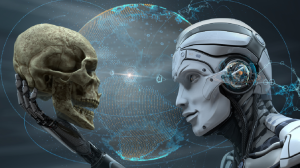AI death calculators, tools that predict mortality based on various data inputs, have become increasingly relevant in academic research. These tools harness machine learning algorithms to analyze large datasets, aiming to estimate the likelihood of mortality within a specific time frame. Their applications range from healthcare to demographic studies.
Emergence and Development
Early Stages
The concept of AI death calculators emerged from the need to understand and predict health outcomes based on complex data. Initially, these tools were rudimentary, relying on basic statistical models. However, with advancements in AI and machine learning, their accuracy and complexity have significantly increased.
Modern Capabilities
Today's AI death calculators are capable of processing vast arrays of data, including genetic information, lifestyle factors, and medical histories. They utilize sophisticated algorithms to identify patterns and correlations that may elude human analysis.
Application in Healthcare
Predictive Analysis
In the healthcare sector, AI death calculators are instrumental in predictive analysis. They help doctors assess patient risk for various conditions and mortality, allowing for more informed decision-making regarding treatment plans and patient care.
Personalized Medicine
These tools also contribute to the advancement of personalized medicine. By predicting individual health risks, doctors can tailor treatments and preventive measures to the specific needs of each patient.
Impact on Demographic Studies
Population Health Trends
AI death calculators aid researchers in understanding population health trends. By analyzing data on a large scale, these tools can predict life expectancy and mortality rates across different demographics, helping to inform public health policies and resource allocation.
Aging Population Analysis
They are particularly valuable in studying aging populations. By predicting mortality and health risks among the elderly, researchers can better understand the challenges and needs of this growing demographic.
Technical Specifications
Accuracy and Reliability
The accuracy of AI death calculators is a critical factor. These tools are continually refined to improve their predictive capabilities. However, the reliability can vary based on the quality and quantity of data fed into the system.

Limitations and Challenges
Despite their advancements, these tools face limitations. The accuracy can be affected by biases in the data, and there are ethical considerations regarding the use of predictive mortality data.
Conclusion
AI death calculators represent a significant advancement in both healthcare and academic research. Their ability to analyze complex datasets and predict outcomes has valuable applications, though they must be used with an understanding of their limitations and ethical implications.
For more detailed information on AI death calculators, visit here.